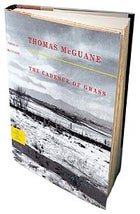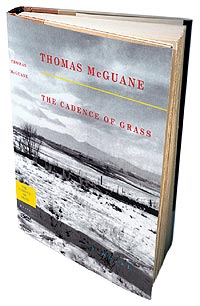
The Cadence of Grass
by Thomas McGuane
(Knopf, $24)
A HEARTY WELCOME-HOME: After a decadelong foray into nonfiction, Thomas McGuane returns to Storyville with a tale of familial strife and kidney theft played out against Montana’s sweetgrass valleys. The Cadence of Grass, McGuane’s first novel since 1992, concerns the Whitelaws, a dysfunctional clan that made its fortune owning a Coca-Cola bottling plant. All hell breaks loose when patriarch “Sunny Jim” dies and decrees in his will that the family dough will go poof! unless his daughter and her estranged husband patch things up. McGuane puts the probate device to good use, spinning a tale of betrayal, revenge, and spousal loathing. (Think Chekhov goes to Bozeman.) Cadence rollicks along on the legs of its comic characters (a klepto Vassar grad, a drag-queen cattleman), but McGuane reserves his sharpest lines for Paul Crusoe, the no-good son-in-law, and his mother Edith, a “Westernist” at the University of Colorado. “She’d raised Paul with the belief that he needed only the broadest views to get through life in the West; these included nativism, appropriate settlement and the dizzying romance of low rainfall. It went right over his head. He only thought about such large themes when he was smoking reefer or had the flu.” Ah, Tom, we missed you. —Bruce Barcott
Beyond the Last Village
A Journey of Discovery in Asia’s Forbidden Wilderness
by Alan Rabinowitz
(Island Press, $25)
IN 1993, AFTER YEARS of negotiations with the government of Myanmar, renowned Wildlife Conservation Society naturalist Alan Rabinowitz wrangled an invitation to Burma. From the beginning, his journey represents far more than an attempt to assess the wildlife of a country notorious for human-rights abuses: To Rabinowitz, reeling from the suicide of a close friend and naturalist in Thailand who despaired of saving his own country’s wildlands, it’s “a last-ditch effort to convince myself that I still cared enough to try to make a difference.” From Putao—where Chinese traders deal in everything from rare red gorals to barking deer—Rabinowitz makes a 250-mile march north to Tahundan, on the edge of the Himalayas, through an area unseen by foreigners for 50 years. Crossing flimsy bamboo bridges, sleeping in huts where rare weasel skins are used as potholders, Rabinowitz and his Burmese team examine their hosts’ “trophy boards” of hunted animal skulls. They ultimately discover a new species, the primitive leaf deer, and succeed in establishing Hkakabo Razi National Park, one of the largest in southeast Asia. The author’s passion for wildlife is always present, but it’s his empathy for people—a lonely monk, an orphaned Tibetan boy—that makes this unforgettable chronicle so moving. —Caroline Fraser
A Tortoise for the Queen of Tonga
by Julia Whitty
(Mariner books, $12)
JULIA WHITTY HAS PRETTY much had it with the human destruction of the animal kingdom. In her debut collection of short stories, Whitty—a producer of nature documentaries who’s spent 20 years capturing the lives of animals on film—trades the limitations of the lens for the possibilities of prose and comes up with ten fables of the wild to even the score. In the title story, Whitty concocts an oddly affecting biography of a 200-year-old tortoise, Tu’i Malila, a gift to the Tongan royal family from Captain James Cook. In “Lucifer’s Alligator,” a hippo-led rebellion in a marine park ends with the narrator, a killer whale, drowning its trainer. “I flung her upward,” recalls the orca, “her arms and legs pinwheeling, the audience squealing, the trainers’ whistles screeching as they skidded down the wet walkways, arms waving. I thought, In the end your arms are useless.” Whitty’s imagination respects no boundaries: At one point, Charles Darwin converses with jellyfish. Whitty doesn’t merely write stories; she reveals the fantastic dreams biologists cook up in the field. —B.B.
Route 66 A.D.
On the Trail of Ancient Roman Tourists
by Tony Perrottet
(Random House, $26)
“SCUSI—where are the penises?” asks Tony Perrottet’s pregnant girlfriend, Lesley, at the start of their Grand Tour-style romp through the great sites of the ancient world. (The penises, in case you’re wondering, are wall paintings preserved in the prostitute quarters at Pompeii.) Usually found swashbuckling in wilder places like Pago Pago, Aussie traveler Perrottet accommodates Lesley’s delicate condition by joining the tourist hordes passing through Greece, Turkey, and Egypt. But he discovers that the trip is not for the fainthearted (he and Lesley hike through freezing rain in Arcadia and dodge rock- throwers on the train to Luxor) and that tourism hasn’t really changed much over the years. The Romans “complained about hard mattresses and bad service…[and] bought cheesy souvenirs wherever they went.” Retracing the ancients’ strangely familiar steps, Perrottet finds something truly rare: a fresh, funny take on this beaten path. —C.F.

